I have a server running on one machine and have the port it uses forwarded to my router, and another machine running the client connecting to the server using my ISP assigned external IP address instead of the local address. This all works fine and it connects but When I check the address of the connected socket (client), The IP address that it shows is completely different? it shows me 148.49.68.0. I can't find this on ipconfig and don't understand where this is popping up from. Shouldn't the client show my external address? (seeing as both computers use the same External IP address).
[EDIT] added server source
#include <iostream>
#include <windows.h>
#include <winsock2.h>
#include <ws2tcpip.h>
#include <string.h>
using namespace std;
int PORT;
const int winsock_version = 2;
const int max_con = 10;
string SERVER_ADDRS;
void Bind(SOCKET &serv,struct sockaddr_in &serv_info,int size);
void Listen(SOCKET &serv,int max_con);
void connection_info(struct sockaddr_in &client);
bool communication(SOCKET &client);
SOCKET Accept(SOCKET &serv);
int main(void){
WSADATA wsadata;
if ( WSAStartup(MAKEWORD(winsock_version,0),&wsadata) == 0 ){
cout<<"-[Initialized.]" << endl;
cout<<"-[Server Address (leave blank to scan for all IP's)]: ";
getline(cin,SERVER_ADDRS);
cout<<"-[Port]: ";
cin>>PORT;
struct sockaddr_in serv_info;
serv_info.sin_family = AF_INET;
serv_info.sin_port = htons(PORT);
if( sizeof(SERVER_ADDRS) > 5 ){
cout<<"-[Listening on: " << SERVER_ADDRS << "]" << endl;
serv_info.sin_addr.s_addr = inet_addr(SERVER_ADDRS.c_str());
}else{
cout<<"-[Scanning for All IP's]" << endl;
serv_info.sin_addr.s_addr = INADDR_ANY;
}
SOCKET serv;
serv = socket(AF_INET,SOCK_STREAM,IPPROTO_TCP);
if ( serv != INVALID_SOCKET ){
//------------------------------------------------------------
Bind(serv,serv_info,sizeof(serv_info));
Listen(serv,max_con);
struct sockaddr_in client_info;
int size = sizeof(client_info);
SOCKET client_sock = Accept(serv);
connection_info(client_info);
if (communication(client_sock) == true){
closesocket(serv);
closesocket(client_sock);
}
//------------------------------------------------------------
}
}else{
cout<<"-[Initialization failed, running cleanup.]" << endl;
}
if (WSACleanup() == 0){
cout<<"-[Cleanup Successful.]" << endl;
}
return 0;
}
void Bind(SOCKET &serv,struct sockaddr_in &serv_info,int size){
if ( bind(serv,(sockaddr*)&serv_info,size) != -1 ){
//Binding complete, now clear the port and allow for reuse if needed using setsockopt
char yes = '1';
if ( setsockopt(serv,SOL_SOCKET,SO_REUSEADDR,&yes,sizeof(yes)) != SOCKET_ERROR){
cout<<"-[Binding Successful.]" << endl;
}
}
}
void Listen(SOCKET &serv,int max_con){
if ( listen(serv,max_con) != -1 ){
cout<<"-[Listening for connections.] " << endl;
}
}
SOCKET Accept(SOCKET &serv){
struct sockaddr_in client_info;
int size = sizeof(client_info);
SOCKET recv;
recv = accept(serv,(sockaddr*)&client_info,&size);
if (recv != INVALID_SOCKET ) {
return recv;
}else{
cout<<"-[Invalid Socket.]" << endl;
}
}
void connection_info(struct sockaddr_in &client){
char *connected_ip= inet_ntoa(client.sin_addr);
int port = ntohs(client.sin_port);
cout<<"-[IP:" << connected_ip <<", Connected on PORT:"<< port << "]"<< endl;
}
bool communication(SOCKET &client){
cout<<"[---------------{CHAT}---------------]" << endl;
int bytes_in;
int bytes_out;
char recvd_text[80];
string send_text;
while(true){
cout<<"-[SERVER]: ";
getline(cin,send_text);
if (sizeof(send_text) > 0 ){
bytes_out = send(client,send_text.c_str(),send_text.length()+1,0);
cout<< endl;
if (bytes_out == SOCKET_ERROR){
cout<<"-[SERVER error in sending.]" << endl;
break;
}
}
bytes_in = recv(client,recvd_text,sizeof(recvd_text),0);
if (bytes_in > 0 ){
cout<<"-[CLIENT]: " << recvd_text << endl; //output on screen
}
if (bytes_in == 0){
cout<<"-[CLIENT has disconnected.]" << endl;
break;
}
if (bytes_in == SOCKET_ERROR){
cout<<"-[CLIENT closed unexpectedly.]" << endl;
break;
}
}
return true;
}
